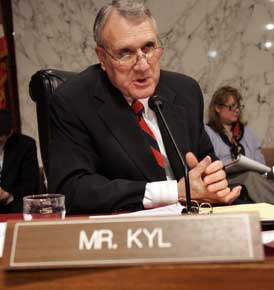
(Credit: Politico)
This past Tuesday, Senator Jon Kyl (R-AZ) came out against the consideration of New START during the lame duck session stating his desire for greater assurances of support from the Obama Administration for the modernization of U.S. nuclear labs and protection from limitations on U.S. missile defense programs. That same day, Vice President Biden and Senate Foreign Relations Committee Chairman John Kerry (D-MA) announced that they will still try to get the treaty through this year, and President Obama reiterated the same the next day.
This announcement uncomfortably came right before President Obama’s trip to Lisbon for a NATO Summit where the alliance that was formed to counter the Soviet Union was slated to roll out its new Strategic Concept, and a lobbying push is now underway to get the treaty considered before Congress adjourns for the year. The National Journal did a great summary of the politics around this issue that can be read here.
I’ll come back to New START in more depth for sure at a later date, but I would like to note an observation by Senator-Elect Roy Blunt (R-MO), a former House whip, who told ABCNews, “If it was so important, it should have gotten done. They should have gotten it done.” New START is widely regarded as Obama’s top foreign policy achievement, it is the centerpiece of his Russia policy, and many high-profile U.S. foreign policy figures from both parties have weighed in to support it. However, the push was not strong enough to actually get the treaty through in spite of the fact that the administration had to know that it would likely be facing a Senate with more treaty skeptics after the 2010 elections than before. Obama is now doubling-down by suggesting that its completion is “a national security imperative”, and he used the NATO Summit as an opportunity to promote the treaty and suggest that failure to approve it will “put at risk the substantial progress that has been made in advancing our nuclear security and our partnership with Russia on behalf of global security.”
Setting aside the details of the treaty, it is a bit surprising that the administration has let this issue linger on considering, again, this is supposed to be its signature foreign policy achievement, the centerpiece of its Russia policy and a national security imperative. Competing priorities and domestic politics are two key reasons why events have unfolded thusly, but these are challenges that always exist and were surmounted in the past even when U.S.-Russian (actually, Soviet) policy was a more important and politicized issue to voters. Will it get done before next year? Maybe, but it doesn’t look great right now even though Senate Foreign Relations Committee Ranking Member Richard Lugar believes the votes are there for it.
The Russians, incidentally, are apparently quite confused as to why New START has become such a contentious issue. <–>